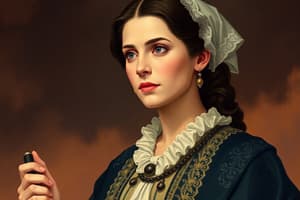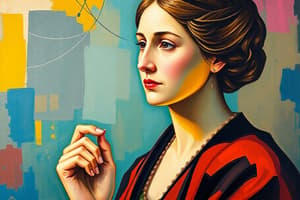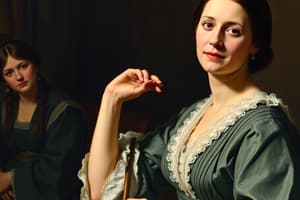Podcast
Questions and Answers
What did Lucretia Mott believe all people possess?
What did Lucretia Mott believe all people possess?
What inspired Lucretia Mott to advocate for equal opportunities?
What inspired Lucretia Mott to advocate for equal opportunities?
What did Lucretia Mott advocate for regarding the abolition of slavery?
What did Lucretia Mott advocate for regarding the abolition of slavery?
What was the outcome of the World Anti-Slavery Convention in London?
What was the outcome of the World Anti-Slavery Convention in London?
Signup and view all the answers
Which of the following best describes Lucretia Mott's perspective on female roles in society?
Which of the following best describes Lucretia Mott's perspective on female roles in society?
Signup and view all the answers
Why did Lucretia Mott believe that laws and traditions wouldn't change until women had a voice?
Why did Lucretia Mott believe that laws and traditions wouldn't change until women had a voice?
Signup and view all the answers
What was a key reason for the organization of the Seneca Falls Convention?
What was a key reason for the organization of the Seneca Falls Convention?
Signup and view all the answers
How did the Seneca Falls Convention organizers draw inspiration from the Declaration of Independence?
How did the Seneca Falls Convention organizers draw inspiration from the Declaration of Independence?
Signup and view all the answers
Flashcards
Lucretia Mott
Lucretia Mott
A Quaker abolitionist and women's rights advocate in the 1800s.
Quaker Beliefs
Quaker Beliefs
A faith that emphasizes the inner light and equality in spiritual matters.
Education Disparity
Education Disparity
The difference in quality of education between boys and girls in the 1800s.
Abolition of Slavery
Abolition of Slavery
Signup and view all the flashcards
World Anti-Slavery Convention 1840
World Anti-Slavery Convention 1840
Signup and view all the flashcards
Seneca Falls Convention
Seneca Falls Convention
Signup and view all the flashcards
Wesleyan Methodist Chapel
Wesleyan Methodist Chapel
Signup and view all the flashcards
Declaration of Independence parallel
Declaration of Independence parallel
Signup and view all the flashcards
Role of women in public life
Role of women in public life
Signup and view all the flashcards
Study Notes
Lucretia Mott
- Lucretia Mott received more education than most girls of her time.
- Quakers believed in treating boys and girls the same.
- By age fifteen, she had finished school and became a teacher.
- Mott was a Quaker, and a member of a Quaker family.
- Quakers believe that everyone has a divine inner spirit.
- Lucretia was a traveling Quaker speaker in the early 1800s.
- She taught at a school in Millbrook, New York, and was a student.
- She observed that girls weren't getting the same education as boys.
- Female teachers were paid less than male teachers.
- Lucretia stood firm on her principles about slavery.
- In 1840, she went to the World Anti-Slavery Convention in London with her husband.
- Male delegates didn't want female delegates there.
- She and other women were unable to participate in the convention, because of their sex.
- This experience made her more determined to work for women's rights.
Studying That Suits You
Use AI to generate personalized quizzes and flashcards to suit your learning preferences.
Description
Explore the life and contributions of Lucretia Mott, a groundbreaking Quaker educator and advocate for women's rights in the 1800s. Discover how her experiences shaped her commitment to equality and anti-slavery, and learn about her role in the early women's rights movement.




